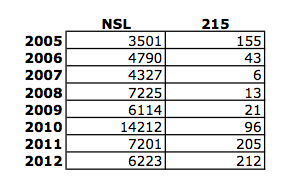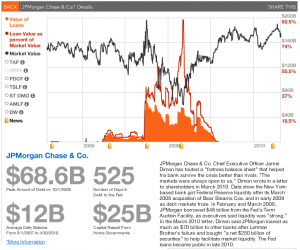Kagro X and I were engaging in a little thought experiment on Twitter to show how easy it would be to solve our dangerous bankster problem by indefinitely detaining them.
It turned out to be pretty easy to do. Here’s how.
First, before you indefinitely detain a bankster, you need to show either that he is,
A person who was part of or substantially supported al-Qaeda, the Taliban, or associated forces that are engaged in hostilities against the United States or its coalition partners, including any person who has committed a belligerent act or who has supported such hostilities in aid of such enemy forces.
Or, you need to show he has supported (using the Iraq AUMF that we’re keeping around to make sure the President’s authority isn’t limited to just al Qaeda),
another international terrorist group that the President has determined both (a) is in armed conflict with the United States and (b) poses a threat of hostile actions within the United States;
Now, making that case with Jamie Dimon is very easy to do, because his company, JP Morgan Chase, has materially helped Iran. We have several pieces of proof it has done so. First, there’s the Treasury Report showing that JPMC:
- Gave a $2.9 million loan on December 22, 2009 to the Islamic Republic of Iran Shipping Lines, which the Office of Foreign Assets Control has found to be involved in WMD proliferation
- Advised and confirmed a $2,707,432 letter of credit on April 24, 2009, in which the underlying transaction involved a vessel identified by OFAC as blocked due to its affiliation with the same Iranian shipping line
- Processed nine wire transfers between April 27, 2006 and November 28, 2008, which totaled $609,308, some of which involved sanctioned Iranian and terrorist entities
- Transferred 32,000 ounces of gold bullion valued at approximately $20,560,000 to benefit a sanctioned Iranian bank on May 24, 2006
We need no further proof that JPMC has done these things. Not only has JPMC admitted to them, but as Janice Rogers Brown has made clear, we cannot question the Executive Branch’s intelligence reports, so all of OFAC’s claims must be accepted as true for the purposes of indefinite detention. And all of that illegal support for Iran happened while Jamie Dimon was President of JPMC.
But there may even be proof–enough, anyway, to satisfy Rogers Brown–that JPMC materially supported an attempt to deploy a WMD in a terrorist attack on American soil. As I have shown, the bank account to which Manssor Arbabsiar transferred almost $100,000 as downpayment for the alleged Quds Force plot to assassinate Saudi Ambassador Adel al-Jubeir was probably a Chase account. And that affidavit should be enough. The FBI, after all, is an intelligence agency. And Janice Rogers Brown does not find redactions–even much more extensive ones–to in any way impair the reliability of Administration claims to justify indefinite detention.
In other words, the Administration has provided sufficient proof that JPMC materially supported Iran to the tune of at least $23 million in illegal financial transactions.
Now, if Chase is indeed the bank that accepted the downpayment for the Scary Iran Plot, we need no further basis to indefinitely detain Jamie Dimon. After all, the government’s Amended Complaint (from the FBI, an intelligence agency whose reports we cannot question) asserts that Abdul Reza Shahlai was the mastermind behind the Scary Iran Plot, and at the time of the plot, he had already been sanctioned as a supporter of the insurgency in Iraq. That was based on a questionable intelligence report, admittedly, but Janice Rogers Brown says we cannot consider such problems. So if Chase did, indeed, play a role in the Scary Iran Plot, then that’s all we need to indefinitely detain Jamie Dimon as head of the entity that materially supported that terrorist attack.
But even if Chase wasn’t involved in the Scary Iran Plot, the Executive Branch can still indefinitely detain Jamie Dimon. After all, the Executive Branch has been claiming that Iran was harboring al Qaeda since 2003. In addition, an official Executive Branch report–a September 12, 2009 diplomatic cable–includes the following hearsay claim, made by Saudi Arabia’s then Minister of the Interior, now the Crown Prince, Nayif bin Abdulaziz:
Iran has hosted Saudis (all Sunnis) — including Osama bin Laden’s son Ibrahim — who had contacts with terrorists and worked against [Saudi Arabia]
And Janice Rogers Brown has said that so long as it appears in an official government document, any hearsay problem is overcome. And as recent reporting makes clear, there’s even some evidence that Iran was at least aware of, and in some ways facilitated, the 9/11 plot itself. That assertion is based on NSA reports which, as official government documents, would meet Rogers Brown’s standard for claims supporting indefinite detention.
All of which would seem to reach the bar of making Iran a force associated with al Qaeda. I don’t necessarily buy these reports, mind you, but again, it’s not for me to question these official government records. And helping such an associated force access $23 million of funding sure seems to qualify as “substantial support.”
Now let me be clear. I don’t advocate indefinitely detaining Jamie Dimon–or anyone else either, particularly not American citizens, no matter how loathsome or dangerous to the United States. But given that our country maintains it is more important to “incapacitate” terrorists and those who support them than to punish those who did trillions of dollars of damage to our economy, we may well have to treat Jamie Dimon as a material supporter of terrorism to get some justice.
And Jamie? If I were you I would report to an Embassy or some other official government office right away, as the government claims Anwar al-Awlaki should have. Because while Obama seems uninterested in indefinitely detaining American citizens, he has been known to kill those he claimed were particularly dangerous.
 Both the NYT (Charlie Savage and Mark Mazzetti) and WSJ (Siobhan Gorman, Devlin Barrett, and Jennifer Valentine-Devries) tell the same story today: the CIA is collecting bulk data on international money transfers. Given that someone has decided to deal this story to two papers at the same time, and given the number of times the Administration has pre-leaked stories to Gorman of late to increasingly spectacular effect (even making most national security journalists forget the very existence of GCHQ’s notoriously voracious taps at cable landings just off Europe) I assume this may be some kind of limited hangout.
Both the NYT (Charlie Savage and Mark Mazzetti) and WSJ (Siobhan Gorman, Devlin Barrett, and Jennifer Valentine-Devries) tell the same story today: the CIA is collecting bulk data on international money transfers. Given that someone has decided to deal this story to two papers at the same time, and given the number of times the Administration has pre-leaked stories to Gorman of late to increasingly spectacular effect (even making most national security journalists forget the very existence of GCHQ’s notoriously voracious taps at cable landings just off Europe) I assume this may be some kind of limited hangout.

